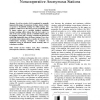Free Online Productivity Tools
i2Speak
i2Symbol
i2OCR
iTex2Img
iWeb2Print
iWeb2Shot
i2Type
iPdf2Split
iPdf2Merge
i2Bopomofo
i2Arabic
i2Style
i2Image
i2PDF
iLatex2Rtf
Sci2ools
JNW
2006
2006
MAC Contention in a Wireless LAN with Noncooperative Anonymous Stations
In ad hoc wireless LANs populated by mutually impenetrable groups of anonymous stations, honest stations are prone to "bandwidth stealing" by selfish stations. The problem is addressed at the MAC level by postulating that (i) honest stations use a carefully designed contention strategy teaching selfish stations that the best reply is to stick to the same strategy, and (ii) a verifiable winner policy be designed so that such a strategy can indeed be found and yields high bandwidth shares for honest stations. For a class of random token winner policies, a number of cycle-by-cycle reinforcement learning strategies are evaluated via simulation using an introduced notion formally akin to evolutionary stability.
| Added | 13 Dec 2010 |
| Updated | 13 Dec 2010 |
| Type | Journal |
| Year | 2006 |
| Where | JNW |
| Authors | Jerzy Konorski |
Comments (0)

